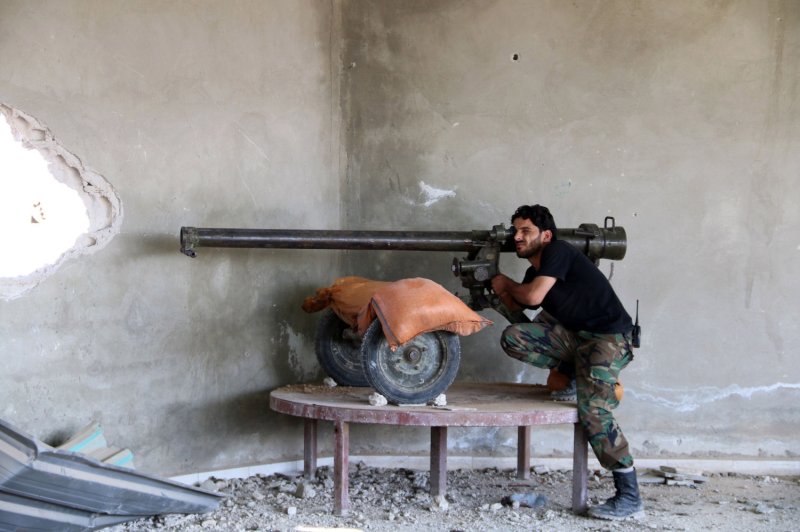A syrian fighter from the rebel group "Free Syrian Army" is seen taking a position during fighting with the Syrian regime Army, in Ghouta, Syria, on October 12, 2015. A ceasefire agreement, brokered by U.S. and Russian leaders, took effect at midnight Friday and prohibits fighting between government forces and rebels. The partial ceasefire, though, allows both sides to continue fighting terrorist militants. Photo by Ammar Al Bushy/ UPI |
License Photo
DAMASCUS, Syria, Feb. 26 (UPI) -- A cessation of hostilities in Syria brokered by United States and Russian leaders formally took effect as the calendar turned to Saturday in the West Asian nation -- and a new round of peace talks to end the five-year civil war lie ahead if the agreement holds, the conflict's chief United Nations envoy said Friday.
The ceasefire began at midnight Friday, which followed days of intense fighting between factions trying to inflict maximum battlefield impact before Saturday's arrival.
The Syrian government and rebel groups previously said they will honor the ceasefire -- which was endorsed just Friday by the U.N. Security Council.
However, many observers are skeptical the two sides will completely refrain from attacking each other in what's been a protracted fight that's often purportedly stepped over the line into some type of international violation.
U.N. special envoy Steffan de Mistura, who has been leading the recent peace talks between President Bashar Assad's regime and varied rebel alliances, said Friday that peace talks will restart on March 7 -- if the ceasefire holds and more aid is delivered to the war-scarred nation.
U.S. Ambassador to the U.N. Samantha Power said Friday the latter portion of de Mistura's promise is the iffy part.
"Let's be honest. It is going to be extremely challenging, especially on the onset, to make this work," she said.
"The UN Security Council just unanimously voted to endorse cessation of hostilities in Syria -- if implemented (a big if), a real chance to reduce Syrian suffering," she added in a Facebook post Friday afternoon.
"No one can give a 100 percent guarantee," Russian Foreign Minister Sergei Lavrov said.
A Syrian man removes an injured boy from under the rubble following a reported air strike on the rebel-held neighborhood of al-Kalasa in the northern Syrian city of Aleppo, October 30, 2015. A ceasefire agreement, brokered by U.S. and Russian leaders, took effect at midnight Friday. Photos by Ameer Alhalbi/ UPI
"[The ceasefire] is potentially, a historic junction -- to bring an end to the killing and destruction and to start a new life and new hope for the Syrians," de Mistura said after the Security Council's vote Friday.
Part of the reason for so much skepticism is due to the fact the agreement is only a partial ceasefire. Although the accord calls for the end of fighting between the Syrian government and rebel factions, it still allows for fighting by both sides -- as well as allied support from Russia and Iran (for Syria) and the United States (for rebels) -- that target terror groups ISIS and the al Nusra Front in the country.
"I want to express hope that our American partners will take that into account," Russian President Vladimir Putin said Friday, according to the Moscow Interfax news agency.
Because the agreement only removes one opponent from each side's gun sights, but allows them to target others, some analysts believe civil war-related battles will continue to be fought after the ceasefire's implementation.
"None of us are under any illusions. We're all aware of the many potential pitfalls, and there are plenty of reasons for skepticism," President Barack Obama said earlier this week. "But history would judge us harshly if we did not do our part in at least trying to end this terrible conflict with diplomacy."
Further muddying the situation, some members of rebel forces are also connected to the al Nusra Front -- meaning that, technically, they are simultaneously included and excluded from the ceasefire agreement.
Some opposition members fear Assad's regime will use that loophole to keep up attacks against rebel forces, which, in turn, could bring the entire peace process to a halt. Nusra Front chief Abu Mohammad al-Golani has urged rebels to ignore the ceasefire.
Some anti-Assad activists reported breaches of the ceasefire in Syria early Saturday but none were immediately confirmed.
Also Friday, roughly 100 different Syrian rebel groups committed to the cessation accord just hours before the midnight deadline.
More than 200,000 people have been killed in fighting since Syria's civil war started in 2011.
















